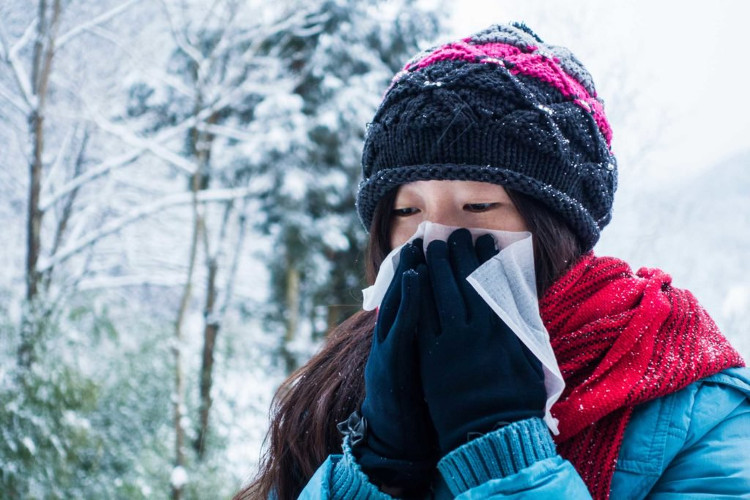Explain why you often runny nose when it's cold?
Maybe in the cold season, we often get into it even if we don't want it because the "green nose" is not a good thing to see. But why do we encounter this phenomenon every winter? The article will give you interesting explanations about one of the body's natural reflexes.
According to ScienceAlert, about 50-90% of people experience runny nose when it is cold. This natural reaction can be considered a symptom of a cold or needing body heat. For people with asthma, eczema or flu, it may even be more frequent than normal people.
The task of the nose is to warm and moisturize the air you breathe in every second. The reason is to warm and moisten the air because they will limit the stimulation of cells in the lungs. When breathing in cold weather, the nose can warm the airflow up to 26 degrees Celsius or up to 30 degrees Celsius.

About 50-90% of people have runny nose when it is cold.
The air humidity after going into the nasal cavity is usually about 100%, no matter how cold the air is. This shows that the nose always works very well in any case to create the best air quality before reaching the lungs.
But why is the nasal secretion (nasal discharge) every time it gets cold?
When it gets cold, the air often becomes dry and has very low humidity, usually only about 40-50%. This air will irritate the nerves inside the nose. And the nose is forced to send a signal to the brain through nerves to enhance the moisture to the nasal cavity.
After receiving the order, the brain will signal to increase blood flow to the nose, allowing blood vessels around the nose to expand and warm the air through.

You can take up to 300-400 ml of nasal water every day when the upper nasal defense mechanism is activated.
Besides, the nose is also ordered to produce more fluid (through the salivary glands) to provide more moisture for the air to pass through. Cold and dry air also stimulates the immune system cells (mast cells) in the nose. When stimulated, the cells produce fluid in the nose or nose to moisten the air.
It is estimated that you may lose up to 300-400ml of nasal juice daily when the upper nasal defense mechanism is activated.
How to control when the nose is flowing continuously?
Heat and dehydration are very closely related. Heating the air in the nasal cavity means that the lining becomes cooler than the body temperature.
During this time, the evaporation process in the nasal cavity helps moisten the breathing air also occurs. But this water evaporation process requires a large amount of heat from the nose.
The blood vessels around the nasal cavity act as "heaters" that will flow faster to bring blood to the nasal cavity, heating it.

A handkerchief or wind oil will work very effectively with runny nose.
This reaction is not unusual when the task of warming the air into the body is much more important than the heat loss in the nose (the normal reaction of the body in the cold is to transfer blood from the skin surface to the Deeper blood vessels to minimize heat loss in the skin).
However, it is clear that both of these tasks are difficult to achieve an equilibrium between the amount of heat and moisture lost from the nose.
When the mechanism compensates for the excess moisture in the nose, moisture exceeds the amount needed to moisten the cold air, you will now see uncontrollable runny nose. The temporary reaction to do is blow your nose to flush out too much fluid, blocking the airway.
Mast cells (mast cells) are often more sensitive to people with asthma, allergies, especially sensitive to environmental irritation and temperature changes. Therefore, you will see this situation happen to them more often.
Nasal congestion or even sneezing can be the most visible symptoms of cold air attacking your respiratory system. In such cases, a handkerchief or wind oil will work very effectively with runny nose.

Always keep the nose warm when going out in the cold because it is easily exposed to cold air.
However, the best way to avoid runny nose is to try to keep your nose warm. If you don't need to go out in the cold, then you can help with some runny nose. Besides, you can put a humidifier in the house when the weather is too dry.

Try using some sprays to moisturize the nasal cavity before going out.
But if you're forced to go out, remember to wear a mask, a warm scarf, use nasal sprays to moisturize or immediately try a little hot oil on either side of your nose to keep heat and avoid irritating nose because of the cold air.
Hopefully the above explanations will provide readers with an understanding of one of the body's normal mechanisms.
- Treat your child's runny nose without medication
- Why is the nose running when we have a cold?
- A runny nose should not use antibiotics
- Children may be deaf only because ... runny nose
- Look at the epidemic of guessing disease
- What do you understand about infections?
- Decoding your baby's cough: Causes, symptoms and treatments
- How will the body change when the temperature drops to 10 degrees Celsius?
- Find out how to prevent a cold in the winter
- Bloody nose, cause?
- Management when the nose bleeds
- Explain why we like to pick our nose
 Green tea cleans teeth better than mouthwash?
Green tea cleans teeth better than mouthwash? Death kiss: This is why you should not let anyone kiss your baby's lips
Death kiss: This is why you should not let anyone kiss your baby's lips What is salmonellosis?
What is salmonellosis? Caution should be exercised when using aloe vera through eating and drinking
Caution should be exercised when using aloe vera through eating and drinking The truth behind many ancient Egyptian statues lost their noses
The truth behind many ancient Egyptian statues lost their noses  Why do pollen make you sneeze?
Why do pollen make you sneeze?  Why do dogs have a cold nose than normal temperature?
Why do dogs have a cold nose than normal temperature?  Why do people get stuck in one nose when they are sick?
Why do people get stuck in one nose when they are sick?  What is purulent rhinitis?
What is purulent rhinitis?  Nosewalker - The most strange animal on Earth, despite having legs, uses its nose to move
Nosewalker - The most strange animal on Earth, despite having legs, uses its nose to move 